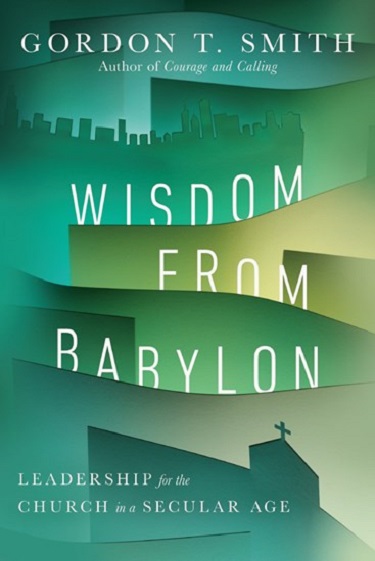 Gordon T. Smith: Wisdom from Babylon: Leadership for the Church in a Secular Age (InterVarsity Press, 2020)
Gordon T. Smith: Wisdom from Babylon: Leadership for the Church in a Secular Age (InterVarsity Press, 2020)
Gordon Smith’s new book has received praise from several quarters – including from David Fitch, which pretty much assures quality – but I am particularly pleased to see comments by two local scholars:
Jason Byassee, Vancouver School of Theology:
I just love how Gordon Smith does theology. His views are evangelical, ecumenical, catholic, orthodox and justice-hungry, with that wild concoction all put in service to a small but scrappy university in Alberta [and, from time to time, Regent College].
We need more leadership like his, informed by theology like his, expressed as lovingly and wisely as this.
Steven Garber, Regent College (just retired):
To be in but not of the world. Drawing on a lifetime of careful study, Gordon T. Smith brings together spiritual theology, sociological analysis, church history and cultural critique in his new book, Wisdom from Babylon.
Having apprenticed himself to the church’s most trusted teachers whose wisdom still shapes the life and labor of faithful people centuries later, he is at the same time attentive to the contemporary complexity of this task, thoughtfully engaging the tensions of being the church in the globalizing, pluralizing, and secularizing world that is ours.
Following is an excerpt from the conclusion of Wisdom from Babylon.
When we speak about what it means to provide leadership for the church in a secular age, it is imperative that we consider the place of hospitality.
Hospitality is a complement and, in many respects, an essential element of all the competencies and capacities discussed in this book. This has always been the case, of course.
Hospitality has always been basic to what it means to be the church. But now more than ever, without hospitality, any speaking about the gospel comes up empty. We feel this most keenly in a pluralist, secular society. . . .
The experience of coming to faith in Christ looks and feels very different in a secular society. As often as not, it is a journey – a series of conversations and experiences by which a person, slowly and gradually, comes to an awareness of the other, the transcendent, including the remarkable wonder that this transcendent other is a benevolent presence and has a name: Father, Son and Holy Spirit.
Because this tends to happen slowly, the genius of congregational life in this regard is twofold: first, that we know the art of hospitality, and second, that we are intentional in our approach to Christian initiation.
But it is essential that we do not start with Christian initiation. True hospitality does not have a preconceived agenda; it is not a technique by which people are treated as a means to an end. We eschew an instrumentalist approach to others.
It is not, ultimately, about being friendly to someone so they buy the product I am selling or embrace my religion. True hospitality is an end in its own right; it needs no other justification than that this is what it means to be the church.
Hospitality is basic Christian practice, but it is a learned art – a cultivated capacity. It comes naturally to no one. Think in terms of concentric circles.
We begin with our own faith community; in the words of 1 Peter we are hospitable to one another “without complaining” (1 Peter 4:9). We welcome each other, in community.
Then this disposition toward each other necessarily shapes the way we engage the immediate neighborhood and, more, the town and city in which we are located. Here the imperative is that we learn to welcome the other whose politics and religion might be quite foreign to our own.
And then, of course, we welcome the refugee, the immigrant, the stranger. In the end, the true test of our hospitality is whether it is offered with no expectation of return or benefit to the one offering the hospitality. We do it because that is what Christians do.
Hospitality is a virtue to which the ancient church calls us, and it is consistent with the prophetic witness. Hospitality is part of the very heart of God and thus one of the hallmarks of the reign of God in our world.
Hospitality is an essential spiritual practice for a world that is marked by diversity, high migration and political polarization. It is an act of both generosity and justice.

Gordon Smith
Hospitality means that we receive the other, but it also means that we go to the other. We tend to them in their place; we receive their hospitality. We both give and receive. The boundaries in our lives are permeable – we receive others into our world and we graciously enter into the world of the other.
We take a risk with the other; we eat with the other. We learn from and with the other, including our Muslim neighbor. We confront our fears, asking if it makes any sense whatsoever that fear keeps us from embodying the gospel and showing radical hospitality to the other.
This is why it is so imperative that we cultivate the interiority by which we live in an anxious world with grace, integrity, courage and creativity.
Taken by permission from Wisdom from Babylon by Gordon T. Smith. Copyright (c) 2020 by Gordon T. Smith. Published by InterVarsity Press, Downers Grove, IL. www.ivpress.com
